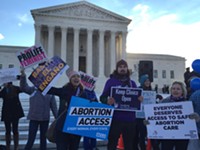Abortion Regulation Trial Concludes
Judge will rule "as quickly as I can"
By Jordan Smith, 1:15PM, Wed. Oct. 23, 2013
Unless a federal judge blocks implementation of Texas' new sweeping abortion regulations, 13 clinics across Texas – including Planned Parenthood in Austin – would as of Tuesday be unable to provide women with safe and legal abortion care.
The new regulations, contained in House Bill 2, passed this summer during a special-called legislative session, would quickly leave more than 22,000 women without any meaningful access to care, Janet Crepps, a lawyer for the Center for Reproductive Rights argued in federal court Wednesday morning.
Crepps represents Whole Woman's Health, which has five clinics across Texas – three of which would close on Oct. 29, the date the regulations at issue are slated to take effect. In addition, clinics in Fort Worth, San Antonio, Harlingen, Mc Allen, Waco, and Killeen will shutter their operations, Crepps told federal district Judge Lee Yeakel, who is presiding over a trial challenging the new regulations. The impact of the challenged provisions "could not be more stark," Crepps argued.
At specific issue in this lawsuit – filed by abortion providers (including WWH and Planned Parenthood) and the ACLU – are a requirement that abortion doctors obtain hospital admitting privileges within 30 miles of each facility where they perform the procedure, and a mandate that doctors follow an older protocol for administering pharmaceutical abortion.
At the close of court this morning, Yeakel said he will issue a ruling in the case "as quickly as I can," and that he recognizes "the clock is ticking." Yeakel must decide if the controversial provisions represent a constitutional restriction to abortion based on a compelling state interest to do so, or whether they violate due process and equal protection provisions by creating an undue burden on women seeking access to legally protected care.
In testimony presented over two days this week, doctors and providers said the hospital privileges provision is not necessary (women experiencing complications would be told to go to the nearest hospital emergency department and not to travel to whatever facility is close to where they obtained abortion care), and that at least 13 clinics will close if that provision takes effect on Tuesday because those clinics have not been able to obtain privileges for their doctors within the specified distance, and have not been successful in recruiting other, already privileged physicians to take over the work. According to testimony from UT professor Joe Potter, a demographer and principle researcher on the Texas Policy Evaluation Project, which is tracking the impact of legislation restricting access to family planning and abortion in Texas, the expected clinic closures will leave more than 22,800 women without access to the care they need, testimony Crepps cited in her hour-long closing arguments.
Closing the state's defense, Deputy Solicitor General Andy Oldham argued that the providers and doctors suing for relief have failed at carrying the "crushing [legal] burden" of proving that the provisions would actually have the impact the plaintiffs are asserting. Because they're challenging the law before it takes effect, and asking the judge to nullify it – a "facial" challenge to its legality – the providers carry the burden of showing that "every application" of the provisions would be unconstitutional: Just because some doctors don't like the medication abortion provision doesn't do that; arguing that the admitting-privilege provision would prohibit doctors for practicing abortion doesn't do that; and arguing that it's simply "bad public policy" doesn't get there either, Oldham argued. In the first instance, that's a question "for the FDA," in the second, "that's a call for the hospitals," and in the third, "that's a call for the Legislature," he said.
He said the state has not only an interest in protecting the safety of women via both provisions, but also an interest in protecting fetal life – for example, the second of a two-drug abortion-inducing cocktail has been known to cause birth defects in fetuses, he argued (presumably those that weren't properly aborted and then are carried to term). And that alone "is sufficient" to create a compelling state interest in regulating pharmaceutical abortion.
Yeakel asked Crepps how he should weigh the state's assertion that the provisions were enacted to protect its interest in "fetal life." U.S. Supreme Court precedent allows for state-imposed restrictions on abortion based on that "legitimate and substantial interest," he noted. Crepps said that in balancing those two interests, Yeakel should consider whether either of the two provisions at issue in this case have any connection to that stated desire; the answer, she said, is that they do not. The state must assert a "permissible connection" between its stated interest and the provisions beyond a simple desire "to make abortion less accessible."
Take, for example, the argument about birth defects related to medication abortion; in that instance those defects could occur regardless how the medication is administered, she said, but it would not be legal to outlaw all medication abortion.
Indeed, witnesses this week noted that the older protocol, which appears on the drug's label, requires a higher dose of the drugs, and carries a greater risk of complications – including infections – than does the newer, "off-label" protocol developed through years of "evidence-based medicine." That updated protocol, which has been the subject of several large-scale studies, has become the norm. The fact that the Food and Drug Administration has not relabeled the drug (a process that has to be manufacturer driven and is costly) says nothing about whether the agency disapproves of the updated protocol, Crepps pointed out.
If not the FDA, then who decides "when the medical advance is sufficient" to impact a case such as this, and who decides how many physicians following a certain protocol are enough to qualify as an advance in medicine, Yeakel asked.
Crepps may not have been able to answer that specifically, but she said that by mandating that doctors follow the older and medically riskier protocol, the "state of Texas [has] interceded in the normal [process] of medical advancement," she said. And "it now bears the burden of showing that's necessary."
Oldham, however, argued that it is the plaintiffs that carry the burden of proving the restrictions would be harmful or leave women without meaningful access to care, and they haven't done so. Although the evidence before Yeakel includes testimony and written declarations from clinic operators attesting that they will shut their doors next week because of the restrictions, and includes the demographic extrapolations compiled by Potter, neither is enough to go on to prove their case, he argued.
"Is it the position of the state…that there is no proof to support the allegations made by providers" that at least 13 clinics will close and that more than 22,000 women will lose care, Yeakel asked.
Yes, Oldham said; just because the plaintiffs have "repeated" those assertions does not make them so.
"So, after the 29th it'll be business as usual?" Yeakel followed up.
"I don't pretend that I can see the future," Oldham said. "So what will happen on Tuesday, I don't know, but they haven't proved it to the court."
In rebuttal, Crepps said she was "surprised" to hear Oldham's argument that appeared to stop just short of "calling our witnesses dishonest" about what they say will happen next week if the law is not blocked.
She suggested that Oldham's assertion is just a "backdoor way of arguing" that the plaintiffs, instead of suing now and making a facial challenge before the law takes effect, should have to wait until after the law's effects are felt, and "that we would have to wait for the disastrous consequences…before we can [seek] any Constitutional relief."
There is little doubt that whoever loses will appeal the decision to the 5th U.S. Circuit Court of Appeals – and potentially to the U.S. Supreme Court – a reality Yeakel noted several times during the trial in asking the lawyers to keep their arguments focused specifically on whether the Texas provisions are legal under the high court's precedent. Similar provisions have been successfully challenged in a number of states – including in Oklahoma, where an appeal based on a medication abortion provision is pending before the Supreme Court. Hospital admitting privilege provisions have been enacted – and blocked – in Mississippi, Alabama, Wisconsin, and North Dakota.
Got something to say on the subject? Send a letter to the editor.
Read more of the Chronicle's decades of reproductive rights reporting here.
A note to readers: Bold and uncensored, The Austin Chronicle has been Austin’s independent news source for over 40 years, expressing the community’s political and environmental concerns and supporting its active cultural scene. Now more than ever, we need your support to continue supplying Austin with independent, free press. If real news is important to you, please consider making a donation of $5, $10 or whatever you can afford, to help keep our journalism on stands.
Mary Tuma, April 24, 2019
Richard Whittaker, May 27, 2015
Mary Tuma, June 7, 2016
Mary Tuma, June 29, 2015
May 22, 2014
Women's Health, Criminal Justice, abortion, HB 2, Planned Parenthood, Whole Woman's Health, Amy Hagstrom Miller, Janet Crepps, Center for Reproductive Rights, Lee Yeakel, courts, reproductive rights, reproductive equity, family planning, medication abortion, Andy Oldham, Rick Perry, Greg Abbott













